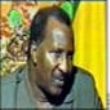African Union delays decision on peacekeeping force for Darfur
 ADDIS ABABA, Aug 9 (AFP) — The African Union (AU) delayed a decision on the planned deployment of an African peacekeeping force in Sudan’s war-torn western Darfur region, AU diplomats said.
ADDIS ABABA, Aug 9 (AFP) — The African Union (AU) delayed a decision on the planned deployment of an African peacekeeping force in Sudan’s war-torn western Darfur region, AU diplomats said.
AU Commission Chairman Alpha Oumar Konare “is still working on the modalities and the mandate of the (planned) peacekeeping force in Darfur and once he finalises them he will formally present them to both parties for their comments and opinions,” an AU official told AFP at the end of the meeting.
“Once the AU Peace and Security Council gets the reaction from both sides (Sudan government and Darfur rebels) it will take a decision,” said another AU diplomat, who did not want to be named, at the AU headquarters in Addis Ababa.
It was not clear when the council will meet again.
Council members were weighing whether to transform a 300-strong protection force, which is yet to be deployed in Darfur, into a peacekeeping force, Sam Ibok, head of the AU’s peace and security department, told AFP earlier Monday.
The AU protection force, when deployed, will be charged with protecting about 120 AU observers currently operating in the region which has been a theatre of 17 months of conflict between two rebel groups and Sudan’s troops, backed by a militia called Janjaweed.
Rwanda and Nigeria will contribute to the protection force.
Sudan’s ambassador to Ethiopia and the AU, Osman Al-Sayyed, who procedurally walked out of the meeting because Sudan was the topic of discussion, said the embattled African nation had also given up the chairmanship of the meeting for Algeria.
Sudan is supposed to chair the AU peace and security council this month.
Al-Sayyed told AFP that Sudan would respond to the issue of peacekeeping force once the AU formally informs the Khartoum government.
Konare also briefed the council about the Arab League meeting in Cairo over the weekend, where Arab nations asked the UN to give Sudan more time to meet requirements of a resolution it passed on July 30.
The resolution demanded that the Khartoum government rein in the Janjaweed militia, blamed for terrifying brutality in Darfur, in 30 days, or face international “measures”.
The AU announced on August 4 its plans to transform the protection force into a peacekeeping one with broader mandate of ensuring that peace prevails in the resource-rich Darfur.
Ibok said the government in Khartoum was “not opposed to an African force,” and Foreign Minister Mustafa Ismail had said that the government “will look into it when they officially receive communication from the AU.”
But he recalled that Khartoum was against the idea of sending troops to Sudan from the United States or other Western countries.
The council also requested both parties “be represented at the highest level” at peace talks expected to start in Abuja, Nigeria in August 23, according to a communique issued at the end of the meeting.
The UN estimates that up to 50,000 people have been killed since Sudan’s army forces and the Janjaweed cracked down on a rebellion by minority tribes which erupted in Darfur in February 2003, but the government vehemently disputes that figure.
Another 1.2 million people have fled their homes in Sudan and up to 200,000 more have been settled in makeshift camps in eastern Chad, the UN says.
